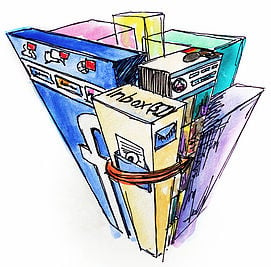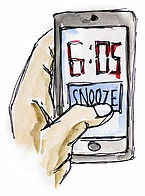Do we ever actually leave work?
The “9 - 5” lifestyle supposedly consists of waking up early in the morning, going to work, then coming home at night to unwind and relax before the cycle starts again. But in these ever-accelerating “modern times,” accessibility to almost everything and anything is increasingly easy. While this might sound glorious for those looking for late-night pizza delivery at 2:35am, it might not sound so great for those whose bosses call them at 5:03pm needing a business proposal in the next few hours.
We are so connected that the 9 – 5 schedule is not actually 9 – 5 anymore, not even close.
 We live in a digitized, computerized age where the constant beeping of incoming text messages, pinging of emailmupdates, and Instagram notifications have made our lives noisier and more stressful. On Facebook alone, 4.75 billion content items are shared daily - and that was in 2013. Sure, the regular texts, emails, and tweets allow us to keep up on social media and prevent us from the all too real condition, FOMO (‘Fear of missing out”). But all of this connection also makes us feel like we have a second full-time job.
We live in a digitized, computerized age where the constant beeping of incoming text messages, pinging of emailmupdates, and Instagram notifications have made our lives noisier and more stressful. On Facebook alone, 4.75 billion content items are shared daily - and that was in 2013. Sure, the regular texts, emails, and tweets allow us to keep up on social media and prevent us from the all too real condition, FOMO (‘Fear of missing out”). But all of this connection also makes us feel like we have a second full-time job.
 We wake up to the vexing sound of our phone’s alarm clock and immediately scroll through the list of messages and updates we received while we were getting our (hardly ever) “8 hours” of sleep. Connectivity has become the new reality, creating the expectation that every single individual should be available at all times and making a moment to yourself seem almost impossible.
We wake up to the vexing sound of our phone’s alarm clock and immediately scroll through the list of messages and updates we received while we were getting our (hardly ever) “8 hours” of sleep. Connectivity has become the new reality, creating the expectation that every single individual should be available at all times and making a moment to yourself seem almost impossible.
When you unplug, you’re eliminating a major life distraction. Max Blumberg, a research psychologist from Goldsmiths, University of London, explained that our “brains were never designed to be always on and permanently connected with the amount of stimuli that we get” today.
If you unplug, even for a moment, you can save on your data charges and get a better quality of sleep. Further, you can also increase productivity by getting rid of ‘tech-neck” – the new phrase used to describe the strain you may feel while constantly looking down at your smartphone or computer monitor for long periods of time.
Afraid an unplug will intensify your case of FOMO? We’ve got our eyes on a few ideas to help!
1. The Phone Stack
It’s a game that originated over meals or social gatherings, attempting to encourage face-to-face interactions. What is the point of ‘social’ media when you are already at a ‘social’ event, ‘socializing’ with others?
 Traditionally the game starts after everyone has ordered and is now waiting for their meals to arrive. Everyone in the group must give up their phones until the end of the meal by placing them face down on top of one another in the center of the table. The goal is to see who can go the longest without getting their fidgety fingers on their device. Whoever succumbs to their addiction must suffer whatever consequence the group decided upon before the stacking began. For example, at a dinner maybe the loser (the one who grabs their phone first) has to foot the bill.
Traditionally the game starts after everyone has ordered and is now waiting for their meals to arrive. Everyone in the group must give up their phones until the end of the meal by placing them face down on top of one another in the center of the table. The goal is to see who can go the longest without getting their fidgety fingers on their device. Whoever succumbs to their addiction must suffer whatever consequence the group decided upon before the stacking began. For example, at a dinner maybe the loser (the one who grabs their phone first) has to foot the bill.
You made plans with your peers for a reason, so it’s time to work on your in-person social skills!
2. The Hour-A-Day Power-Down
Choose a specific period of the day to intentionally turn off your smartphone and power-down. It can be your lunch break, dinner, or even the first hour of the day. Choose a time that works for you and you’ll start to understand the importance of being temporarily disconnected.
3. Turn off all push notifications
Turn them off. Your co-workers can keep pinging and buzzing you to their heart’s content. But don’t let it get in the way of enjoying your Zen-yoga classes every Saturday morning; Sally’s computer problems are not your problem during that time. Few things are so urgent they can’t wait an hour. And they can always call/text you if there’s a real emergency.
Life is happening right in front of you, and you’re missing it as you look down at your screen. Life, Yes, there is definitely a time and place for dropping a line of emoji’s on your friend’s wall for National Best Friend Day. But a real, face-to-face conversation will trump an emoji any day. The experiences that happen around us will never repeat themselves, so unplug, get off Instagram for a bit and live them.
It turns out Ferris Bueller was speaking prophetically when he dropped this famous line, “Life moves pretty fast. If you don’t stop and look around once in awhile, you could miss it.”
Sources:
Constine, Josh. "Facebook’s Growth Since IPO In 12 Big Numbers." TechCrunch. N.p., 17 Mar. 2013. Web. 07 Mar. 2016.
Przybylski, A. K., Murayama, K., DeHaan, C. R., & Gladwell, V. (2013), "Motivational, emotional, and behavioral correlates of fear of missing out.", Computers in Human Behavior 29 (4): 1841–1848
Clarkson, Natalie. "What Happens to Your Brain When You're Always Online?" Virgin.com, 20 Aug. 2015. Web. 07 Mar. 2016.


